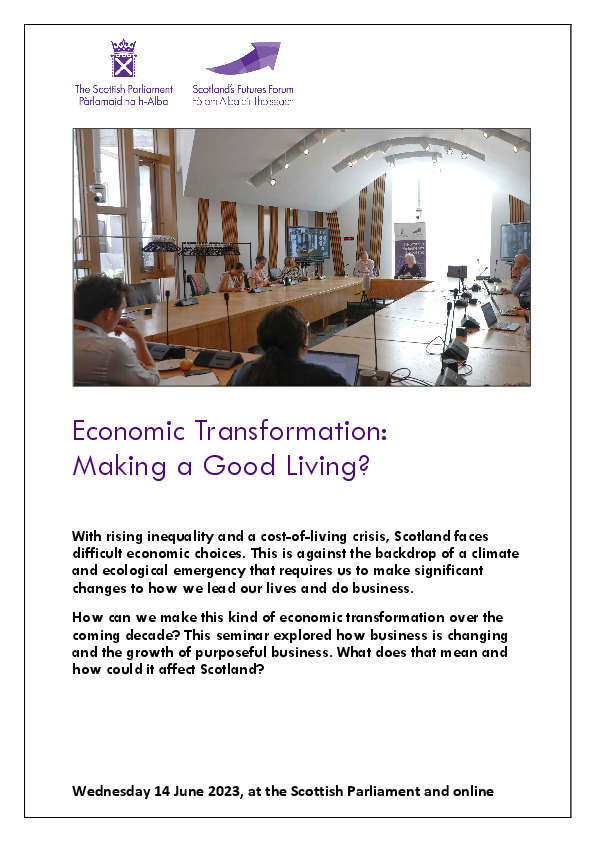Wednesday 14 June 2023, at the Scottish Parliament and online
With rising inequality and a cost-of-living crisis, Scotland faces difficult economic choices. This is against the backdrop of a climate and ecological emergency that requires us to make significant changes to how we lead our lives and do our business.
How can we make this kind of economic transformation over the coming decade? This seminar explored how business is changing and the growth of purposeful business. What does that mean and how could it affect Scotland?
Introduction
Chaired by Claire Baker MSP on behalf of the Economy and Fair Work Committee, this seminar heard from Gareth Williams of the Scottish Council for Development and Industry (SCDI) on its 2030 Blueprint for Scotland’s economy and its work on the Business Purpose Commission.
The seminar was part of a series on different ideas of economic transformation within Scotland. It was attended by MSPs, MSP staff and parliamentary staff.
Key messages
Business purpose
A business’s purpose is its reason for existing, which drives its strategy, activities and sales. A strong business purpose makes it clear why customers should buy from you, why people should work for you and why society should trust you.
The sectors that have been most affected by recent economic challenges are less likely to agree that the purpose of business is to find profitable solutions to the problems of people and the planet.
But companies that aim to benefit all stakeholders – including their customers, employees, suppliers, communities and shareholders, as well as the environment and natural world – are more successful, delivering higher long-term shareholder returns than their more explicitly profit-driven rivals and creating wider benefits for society.
There are many more people who believe that businesses are not doing enough to tackle economic, social and environmental priorities such as climate change than those who believe they are overstepping the mark.
Paying the real living wage as a minimum; paying fair levels of tax; providing job security for employees; and making a clear commitment to customer services are priorities for businesses who want to secure confidence and trust.
Opportunities for Scotland
Fostering a world-class corporate governance and business support ecosystem; capitalising on Scotland’s sustainable finance cluster; and empowering employees to drive purpose are key opportunities for Scotland.
The UK Government has a role in amending company law to require businesses to state and report on their business purpose and in producing a tax framework which incentivises purposeful business models and practices.
The Scottish Government has a role in scaling up support for business purpose and making business purpose a golden thread in the National Strategy for Economic Transformation (NSET) delivery plan.
Local government should focus on developing place-based networks to engage businesses in tackling local economic, social and environmental missions.
Conclusion
Business purpose is a way of enabling businesses to understand how they can contribute to a new economy while achieving profitability.
Presentation
Our Future Economy: Gareth Williams, Scottish Council for Development and Industry
Gareth described the SCDI as an independent membership network of private, public and social organisations across all sectors, with the shared aim of world-leading sustainable economic prosperity for all of Scotland.
He highlighted the organisation’s 2030 Blueprint for Scotland’s economy document outlining its members’ vision and action plan for the Scottish economy, which was published in 2021 following extensive research and consultation with members and stakeholders.
The blueprint set out to answer the question: What should Scotland be known for in the global economy of 2030?
- Scotland’s economic purpose
- A living lab for innovation
- Learning throughout life
- Healthy places to live and work
It identified four themes that the SCDI believes are vital for long-term economic success.
In his presentation, Gareth focused on the first of those themes and the three associated recommendations in the blueprint:
- Make Scotland a global hub for purposeful businesses that solve the problems of people and planet profitably
- Establish a world-class economic model to address productivity, health and quality of life
- Remove trade and investment barriers to grow free, fair, climate-friendly and digital trade
He set out how, following the publication of the blueprint, the SCDI launched the Business Purpose Commission for Scotland as a joint initiative with the Scottish Government, with 25 commissioners from businesses, education, civic organisations and trade unions, producing what he described as the world’s first business-led, Government-commissioned report on business purpose.
As Gareth stated, the Commission’s aim was to make recommendations for how Scotland could become known at home and globally for nurturing purposeful businesses that make a positive impact on economic prosperity, social wellbeing and environmental sustainability.
The Commission undertook an intensive nine-month programme of work in late 2021 and early 2022, reviewing a wide range of evidence at international, UK and Scottish levels; surveying businesses; arranging a series of workshops and events with businesses and civic stakeholders; and commissioning a public opinion poll.
“The guiding star for business”
Gareth described a business’s purpose as its reason for existing, which drives its strategy, activities and sales. A strong business purpose makes it clear why customers should buy from you, why people should work for you and why society should trust you. It is the guiding star for the business, its directors and employees. Does a business primarily exist to serve its shareholders, or does it serve a broader group of stakeholders, including its customers, employees, suppliers, communities and shareholders, as well as the environment and natural world?
As Gareth highlighted, the international evidence in the Commission’s report suggested that prioritising profits and returns to shareholders as the sole purpose of business harms social prosperity and environmental sustainability, on which successful businesses are built. In contrast, companies aiming to benefit all their stakeholders are more successful, delivering higher long-term shareholder returns than their more explicitly profit-driven rivals and creating wider benefits for society.
He went on to explore why this might be. For example: two thirds of people will spend more for socially driven products. As Gareth noted, evidence from the 2022 Edelman Trust Barometer showed that people around the world wanted more societal leadership from businesses. Many more people believed that businesses were not doing enough, rather than overstepping the mark, across a range of economic, social, and environmental priorities such as climate change.
“Clear support for change”
While he noted that business purpose was not a new idea, Gareth asserted that it was crucial now as we needed businesses to help solve the 21st century’s greatest challenges. He highlighted a range of initiatives such as the Big Innovation Centre and the Purposeful Company Task Force and acknowledged that business purpose should be appropriate for the size, market and stage of a particular business. Some companies may define their role in relation to customers, society or the world, while smaller businesses may define their role in improving the lives of customers and their communities.
Highlighting the results of a public opinion poll from the Business Purpose Commission for Scotland on the role that businesses currently have in society, Gareth said that there was clear support for change from customers, employees and communities.
Along with positive findings from a survey of businesses by the Fraser of Allander Institute, he argued that there was plenty of evidence that businesses’ purposes, values and beliefs had a strong influence over whether people in Scotland chose to buy from or support a business; chose to stop buying from or supporting a business; chose to work for a business or chose to invest in a business.
Gareth posed a question: What practical actions should businesses consider taking in response? He highlighted that the survey results identified the following priorities for businesses to secure confidence and trust: paying the real living wage as a minimum; paying fair levels of tax; providing job security for employees; and making a clear commitment to customer services. However, he acknowledged that public priorities were not limited to those four aspects, and businesses could contribute in different ways.
Gareth said that when businesses were asked what they needed in order to make progress, they prioritised encouraging investment in purposeful businesses; creating new and effective ways of operating; giving employees an effective voice in businesses; supporting purpose-driven business models and developing actionable goals for purposeful businesses.
Based on this research, the Business Purpose Commission for Scotland developed its report “Now is the time for purpose: Putting purpose at the heart of Scottish business”, published in June 2022. The report outlines a bold vision: by 2030, all businesses in Scotland will have become purposeful businesses that profit from finding solutions for people and planet.
As Gareth stated, we want all businesses to be successful in the economy of 2030, and we need to be bold if we are serious about national economic transformation. He highlighted three opportunities that the Commission had identified for Scotland to accelerate business purpose:
- Supporting businesses with purpose by fostering a world-class, corporate governance and business support ecosystem, which mainstreams business purpose
- Financing purposeful business growth by capitalising on Scotland’s sustainable finance cluster to stimulate and increase investment in purposeful businesses
- Empowering employees to drive purpose by creating opportunities through skills development and fair work for everyone in work to help find profitable, sustainable and mutually beneficial solutions.
Gareth emphasised that the Commission was always clear that business purpose must be driven by businesses, so its report started with a call to action for businesses, with three key reasons to make a strong commitment to business purpose:
grow your business – future proof your business – be part of the solution
The report offered a guide for businesses, from starting out to growing to leading, with case studies from purpose-driven businesses in different sectors. Gareth explained that, following on from the report, building on peer-to-peer learning has been a priority for the SCDI.
Recommendations
The Commission made 22 recommendations and identified who should lead on them.
For businesses:
- Define, communicate and measure their business purpose; develop and deliver their purpose through their people strategies
- Increase investment in purposeful businesses by establishing a world-leading ESG investment hub
- Form purpose-driven private, public or third sector partnerships to share learnings, influence change and increase impacts
- Work with Governments and stakeholders to inform and mobilise customer and societal expectations of business purpose
For education and training organisations:
- Make business purpose a mandatory learning outcome in business, education and training
For the UK Government:
- Amend company law and reporting to require businesses to state and report on their business purpose
- Encourage and make it easier for new and existing businesses to adopt purpose-driven business structures
- Produce a tax framework for purposeful business which incentivises purposeful business models and practices
For the Scottish Government:
- Mainstream and scale up public and private sector business support for business purpose
- Make business purpose a golden thread in the national strategy for economic transformation delivery plan
For local government:
- Develop place-based networks to engage businesses in tackling local economic, social and environmental missions
“Not quite plain sailing”
Gareth stated that we now have the evidence for the benefits of business purpose, and we know that it is supported by people and businesses, with the Commission’s recommendations being widely welcomed. However, he suggested that it will not be quite plain sailing from now on, given the war in Ukraine and the cost-of-living crisis.
He described how a second survey earlier this year to take the temperature of Scottish businesses had found that while 41 per cent of firms thought that the purpose of business was to find profitable solutions to the problems of people and the planet, the share of businesses agreeing with it had decreased by 18 per cent from the previous survey, whereas the number of businesses that agreed that the purpose of business was to maximise returns for shareholders and owners within the confines of the law was up by 4 per cent.
As Gareth noted, the sectors that had been most affected by economic challenges, such as accommodation, food services and retail, were less likely than others to agree that the purpose of business is to find profitable solutions to the problems of people and the planet.
While he described the latest results as an understandable response to economic uncertainty and cost pressures on businesses, he highlighted that for more purpose-driven businesses, 54 per cent said that business purpose was just as important, and 39 per cent said that it was more important in the current economic climate. Only 1 per cent of those businesses thought that the current economic climate diminished that role for businesses in society.
However, he pointed out that many businesses did not have a plan in place to define, communicate and measure their business purpose, and he stressed that it was important to support those businesses that have strategies to implement those plans effectively, given the many competing priorities in the current economic climate.
“Prosperity, wellbeing and sustainability”
As Gareth noted, the Scottish Government published its response to the Commission’s report in January, focusing on the two recommendations it was to lead. The next steps will be dependent on the National Strategy for Economic Transformation project on business support.
Already, however, Scottish Enterprise is developing its range of online tools and workshops as well as one-to-one support, and ‘Scotland CAN B’, doing excellent work in this area, is expanding its support for individual business leaders and business support intermediaries.
As Gareth described, the Scottish Government’s new deal for business was set up by the First Minister in acknowledgement of the need for Government and business to reset their relationship. The SCDI is co-chairing the wellbeing economy sub-group, aiming to develop a shared appreciation and articulation of how business contributes to a wellbeing economy and agreement on key areas to actively work together to maximise that.
Gareth ended by reiterating the SCDI’s belief that business prosperity was key to economic dynamism and productivity, which grows prosperity, wellbeing and sustainability. In the global economy of 2030, Scotland should be known for: a living lab for innovations, learning throughout life, and healthy places to live and work.
As a final thought, he posed a question: how can the Scottish Parliament and business work together to support more businesses to find profitable solutions to the problems of people and planet?
Q&A session
“People want businesses to be more purposeful”
Participants raised the issue of how consumers view the importance of business purpose, and in particular whether views had changed as a result of the cost-of-living crisis. When it came to buying products or using businesses, was there a difference between what consumers said and what they did?
Gareth noted that there was a great deal of evidence that the public wanted businesses to be more purposeful and deliver for a wider range of stakeholders, and they wanted that to be built into company law. He conceded that there were obvious challenges during a cost-of-living crisis but pointed out that nevertheless many businesses were taking action, and customers were responding to that.
Highlighting the bigger picture, he pointed to a trend towards more socially responsible goods and services, not just in the UK but around the world, and stated that the SCDI sees that approach as absolutely fundamental for the success of businesses at all levels.
“A wider diversity of business models”
It was suggested that the SCDI, in its approach, appeared to view the core objectives of business through a lens of profitability. A question was raised: what about businesses such as cooperatives, which are focused on community benefit rather than making a profit or adding value for shareholders? As was pointed out, a sense of purpose was already inherent in their approach to business.
Gareth highlighted that the SCVO (Scottish Council for Voluntary Organisations) had been a member of the Business Purpose Commission, and that the SCDI had also worked with Social Enterprise Scotland. As he noted, the SCDI’s report talked about wanting to encourage a wider diversity of business models, including businesses that were profit driven and those organisations that were not.
He also highlighted the SCDI’s desire to make it easier for different models of business to establish themselves, and for businesses to switch between models as changing needs and markets dictated.
He raised the possibility that there may be a degree of suspicion from social enterprises about “purpose washing”, and concerns about what their role might be. As he pointed out, the SCDI report highlighted a desire to reinforce partnerships between businesses and social enterprises, whether that was through communities of practice, sharing learning or encouraging more businesses to incorporate social enterprises within their supply chains.
Gareth acknowledged that the disparity in size between large businesses and small social enterprises could present issues and noted that Social Enterprise Scotland was thinking about how it could engage more medium-sized businesses within that work.
He stressed that the SCDI’s overall focus was on businesses that generated profits as an essential part of what they did, and how they could be more purposeful, and on how to foster much closer partnerships between businesses and other parts of the economy.
“Do all business want to grow?”
Participants noted that there is often an automatic assumption that all businesses wanted to grow, but it was pointed out that some businesses may have seen staying the same size as success for them. Was there a way of articulating that in the language of purpose?
Gareth responded that the SCDI’s approach did not necessarily imply that businesses were getting bigger at every stage; rather, they were embedding purpose more deeply within their organisations. He referenced the SCDI’s work with various B Corp businesses, which had a range of motivations for being in business.
As Gareth pointed out, if we want our economy to be more purposeful, we can do so not only by encouraging all businesses to be purposeful, but by ensuring that purpose-driven businesses take on a larger share of the economy.
He highlighted the benefits of success for purposeful businesses globally too – as they could use their position on the international stage to export more socially and environmentally responsible products and services.
Gareth argued that many corporate scandals over the years had arisen from a fundamental misalignment between the objectives of business and Government and identified business purpose as a crucial way of potentially bringing Government, businesses and the third sector together with a common language and common objectives to deliver on the big challenges of the 21st century, such as climate change and equality.
“We need to strengthen the case even further”
It was identified that corporate governance, and tax avoidance and anti-corruption measures, had a direct correlation with business purpose. Pointing to the SCDI’s recommendations in its report, participants asked about the organisation’s engagement with the UK Government, and the latter’s appetite for action in the business purpose sphere.
As Gareth outlined, some engagement had taken place through the Better Business Act coalition, but progress was not likely on that front in the current session of the UK Parliament. Nevertheless, as he highlighted, the SCDI had said to the UK Government that it could address some of those issues without changing company law in the first instance.
Gareth also noted the SCDI’s recent engagement with the Labour Party, which had made some commitments. However, he identified a degree of resistance within the civil service to some of those changes: a sense that changing company law to say that businesses needed to state and report on their purpose would be a “lawyers’ dream”, leading to challenges in the courts. As he pointed out, however, the Better Business Act coalition was working with the legal sector to highlight why that should not be a concern.
Gareth described how action was being taken in other parts of the world—for example, Canada is looking at its company law—and he questioned why the UK was not doing the same. He expressed his view that there was a sense among officials that the case needed to be strengthened even further by saying that a business purpose approach was a way of attracting investment and that wealth and wellbeing could be delivered through business purpose.
“How do we measure impact?”
The question of measuring progress was raised: how do we define and measure the impact of purposeful businesses? It was suggested that it would be helpful for Parliament if there were defined outcomes in order to see whether there had been an impact.
Gareth flagged up the upcoming review of the Scottish Business Pledge and noted that the SCDI wanted to see it developed as more of a journey than a one-off commitment, with businesses being encouraged to constantly improve their performance against all the criteria in the pledge.
He also highlighted the SCDI’s recommendation that the Scottish Government should create a business purpose maturity index to judge progress, although he acknowledged that there was a degree of hesitancy about taking that on. He identified as a risk the wide range of different metrics used by businesses and investors, and the subsequent difficulties in judging what progress businesses and the economy were making.
Nevertheless, Gareth reiterated that the SCDI was keen that the Scottish Government should develop a series of metrics for Scottish businesses, and that the door was still open there.
“Let’s solve problems together”
It was suggested that the SCDI was arguing for business purpose to be the golden thread running through the Scottish Government’s National Strategy for Economic Transformation, and participants questioned whether the strategy was in fact the right means to deliver on such aims. In particular, it was noted that NSET was very much a long-term strategy, which raised questions about its flexibility to incorporate other aspects.
Gareth responded that while the SCDI was not arguing for changes to NSET, its work had been developed very much in parallel with the strategy. As he described, the Business Purpose Commission had met with ministers and officials and there was a sharing of information and ideas, with business purpose posited as a way of tying all the visionary aspects together to enable businesses to understand how they could achieve profitability while contributing to the transformation of the economy as a whole.
As Gareth noted, SCDI members were asked about NSET delivery, and the response was not overwhelmingly positive on the progress made so far. Very few were seeing progress in line with their expectations, partly because of the cost crisis and everything else.
However, he emphasised that the SCDI’s view was that, rather than throwing out the NSET and reinventing it, we needed to get back to focusing on how we deliver over the longer period of the strategy, while also addressing some of the short-term concerns of businesses.
As Gareth put it, business purpose is fundamental to the priorities across NSET and it links in well with delivering a wellbeing economy, so there is an opportunity for business and Government to work, and solve problems, together.
Speaker

Gareth Williams is Head of Policy at the Scottish Council for Development and Industry (SCDI). He works with members of the to influence public policy in ways that we think will develop a more prosperous Scottish economy. In doing so, he produces research reports and consultation responses, communicates members’ views in Government meetings and creates opportunities for them to engage with key people on big issues.
Gareth has led work on our Blueprints for Scotland’s economy, and reports on subjects like tech, business purpose and natural capital.
Gareth enjoys a daily run and racing or volunteering in parkrun at the weekend. A strong community is important to him and he chairs his primary school’s parent council.
Chair

Claire Baker MSP is a member for the Mid Scotland and Fife parliamentary region and convener of the Scottish Parliament’s Economy and Fair Work Committee.
Attendees
The seminar was attended by Michelle Thomson MSP, Maggie Chapman MSP and Pam Duncan-Glancy MSP, as well as MSP staff and parliamentary staff.
Partners
The event was hosted jointly with the Scottish Parliament Information Centre.




